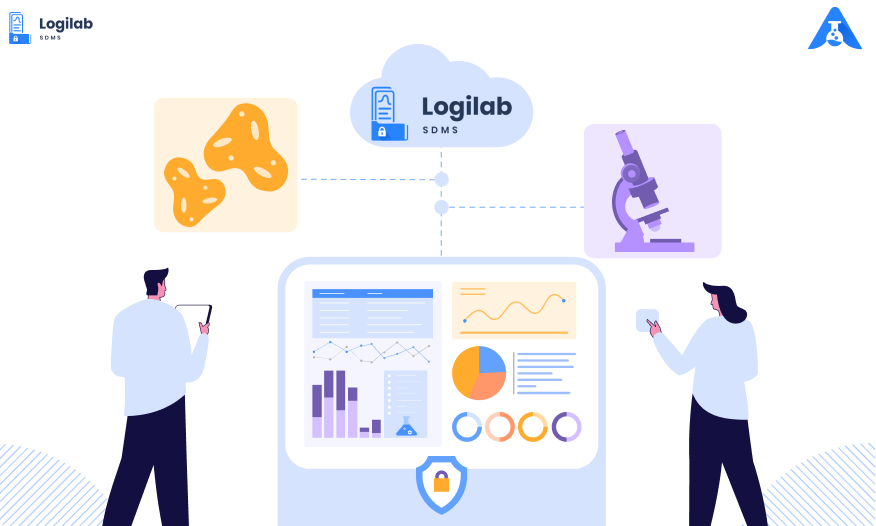Introduction
Managing and securing research data effectively is more crucial than ever in today’s data-intensive scientific environment.
Imagine a system that seamlessly integrates with your existing laboratory setup — automating data capture from any instrument, and securing your valuable data with the highest compliance standards.
That’s exactly what our Logilab SDMS does—an advanced solution designed to transform the way laboratories handle their data, ensuring you stay at the forefront of innovation.
With its robust features—ranging from real-time data access via mobile applications to comprehensive audit trails that meet rigorous regulatory standards.
Whether you’re in pharmaceutical research, academic studies, or the biotechnology sector, understanding how Logilab SDMS simplifies data management with its easy-to-implement features and seamless integration across instruments will be crucial for your groundbreaking research.
What is SDMS?
Scientific Data Management System (SDMS) plays a crucial role in the modern laboratory environment, addressing the intricate needs of data handling and management across various scientific fields. An SDMS is essentially a software platform or system designed to collect, manage, store, and archive data generated from scientific experiments and instruments.
Overview of SDMS
1. Data Collection: Scientific Data Management System automate the collection of data from various laboratory instruments and experiments. This helps in reducing manual errors and ensures that data is captured in a consistent format.
2. Data Storage and Management: SDMS provide a structured way to store both raw and processed data. This often includes powerful search capabilities, enabling quick retrieval of data for analysis and review.
3. Integration: They often integrate with other laboratory information systems like LIMS (Laboratory Information Management Systems) or ELNs (Electronic Laboratory Notebooks), providing a comprehensive view of all laboratory data.
4. Data Security and Backup: SDMS ensure that data is securely stored and backed up, protecting against data loss and ensuring data integrity, which is crucial for compliance with various standards.
Importance of SDMS in Laboratories
Efficiency
Scientific Data Management System greatly enhance laboratory efficiency by
Automation of Data Capture: Automated data entry from instruments reduces time spent on manual data logging.
Streamlined Data Access: Centralized data storage makes it easier and faster for scientists to access and retrieve data, speeding up the analysis process.
Reliability
Data Integrity: With features like audit trails and version control, SDMS help in maintaining the integrity and traceability of data throughout its lifecycle.
Standardization of Processes: By standardizing data collection and storage processes, SDMS reduce variability, enhancing the reliability of experiments.
Compliance
Regulatory Compliance: Many laboratories must comply with regulations such as FDA’s 21 CFR Part 11, Eudralex Annex 11, MHRA, ALCOA Data Integrity, GLP (Good Laboratory Practice), and others. SDMS help in maintaining records in a manner that meets these regulatory requirements.
Audit Readiness: The ability to quickly produce comprehensive data reports and logs makes it easier to comply with audits and inspections.
In essence, Scientific Data Management System are vital for the modern scientific laboratory, ensuring efficient management of scientific data. They enhance productivity by automating routine tasks, improve the reliability of data through better management practices, and help laboratories meet stringent compliance standards. By leveraging SDMS, laboratories can focus more on the scientific research itself, ensuring that data handling does not become a bottleneck in the discovery process.
About Logilab SDMS
Agaram Technologies’ Logilab SDMS is an advanced software system designed to handle scientific instrument data from any analytical instrument and can facilitate data management with access control. It will perform scheduled data capture, cataloguing, archival and facilitate restoring data and has capabilities to extract data of interest from instrument output to be pushed to external systems like ELN, LIMS or ERP. The data files captured are stored as flat files in a secure FTP file server as an encrypted file name.
Data access and viewing is controlled through user rights providing data security. The meta-data like data source, date/time, file size, checksum and user entered tags along with parsed and extracted data is stored in the database.
Full text indexing allows strong search facility ensures availability of required data instantaneously. Built-in integration tools allow you to integrate external systems as well.
Logilab SDMS Key Features
Logilab Scientific Data Management System being a sophisticated Scientific Data Management System has the capability to meet the diverse needs of modern laboratories by enhancing data security, ensuring regulatory compliance, and streamlining operations through automation and integration. Here are the key features of Logilab SDMS that highlight its capabilities:
1. Data Scheduler
This feature automatically captures data in any format from any instrument, whether PC-based or not, including those using RS232 and TCP/IP interfaces. It then securely stores this data in a central repository with version control, ensuring that data integrity is maintained and that previous versions are accessible for reference or audit purposes.
2. Data Explorer
The Data Explorer allows for easy navigation through the system with a user interface designed for security, speed, and efficiency. It supports a broad and fast search capability, enhancing the ability to quickly locate specific datasets, files, or results within the massive volumes of data typically found in scientific research.
3. PDF Print
This feature enables users to view, download, and print data in a PDF format, which is critical for compliance with FDA 21 CFR Part 11 standards. These standards require that electronic records be kept in a human-readable format, which can be easily accessed for review and auditing.
4. Metadata Tagging and Templates
Metadata tagging and the use of templates facilitate better organization, categorization, and standardization of data. This helps in easy identification and retrieval of data, streamlining the research process and ensuring consistency across experiments and studies.
5. User and Password Management
Logilab Scientific Data Management System includes a robust user and password management system that enhances security and operational control through role-based access. This feature ensures that only authorized personnel have access to sensitive data and system functionalities, reducing the risk of unauthorized data manipulation.
6. Audit Trail
The system maintains a comprehensive audit trail that records all changes made to the data, including who made the change, when it was made, and why. This capability is crucial for regulatory compliance and helps in maintaining the integrity and traceability of data.
7. Electronic Signature
Electronic signature is a part of Logilab SDMS features to ensure compliance with FDA 21 CFR Part 11 and Eudralex Annex 11. It helps in tracking data alterations and approvals, ensuring that all changes are authorized and documented.
8. Parsing Engine
The Parsing Engine simplifies the extraction of specific data points from complex datasets, allowing researchers to find and extract the information quickly and easily they need without having to manually sift through extensive data.
9. Mobile Application
Logilab SDMS offers a mobile application that enables data recording and access on the go, allowing for real-time data entry and review, which is essential for dynamic laboratory environments where timely data capture and access are critical.
10. CFR Gateway
This feature bridges the gap for instruments that are not inherently compliant with certain regulatory standards. It adds an extra layer of user authentication and protects data from unauthorized modifications or deletions, bringing older or less sophisticated instruments up to compliance standards.
11. Integration
Logilab Scientific Data Management System integrates seamlessly with other key laboratory systems such as Electronic Lab Notebooks (ELN), Laboratory Information Management Systems (LIMS), and Enterprise Resource Planning (ERP) systems. This integration capability ensures error-free, automated data flow across platforms, enhancing data accuracy and laboratory efficiency.
These features make Logilab SDMS an invaluable tool for modern laboratories, ensuring that data management is both efficient and compliant with the stringent standards required in scientific research and development.
Benefits of Implementing Logilab SDMS
Implementing Logilab SDMS in laboratory environments can significantly enhance various aspects of data management and overall lab operations. Here are the specific benefits across efficiency, data integrity, and accessibility:
1. Simple and Easy to Use Application Interface
Logilab Scientific Data Management System offers a user-friendly interface that is intuitive and easy to navigate. This simple design:
Improves User Experience: A straightforward interface reduces the learning curve for new users and enhances user confidence as they navigate through different functionalities.
Increases Efficiency: When users can quickly find what they need without complications, it speeds up data entry, retrieval, and processing, boosting overall productivity.
2. Time Savings
Faster Implementation: Logilab SDMS is designed for quick deployment, with minimal disruption to existing lab operations. Its compatibility with standard laboratory hardware and software speeds up the integration process.
Operational Efficiency: The automation of data capture and management processes reduces the time required for manual data handling. This means that laboratory staff can focus more on analytical and research tasks rather than administrative duties.
3. Cost Savings in Terms of Paperless Transactions
Reduction in Paper Use: By digitizing records and using electronic formats for data storage and communication, labs can significantly reduce their reliance on paper. This not only cuts costs associated with paper, printing, and storage but also supports environmental sustainability.
Efficient Data Management: Digital data management reduces the need for physical storage space and resources, further driving down costs.
4. Low Cost of Ownership
Standard Technology Architecture: Logilab Scientific Data Management System is built on standard, widely-used technology platforms, which often translates into lower software and hardware costs. This standardization also simplifies maintenance and upgrades, reducing the total cost of ownership over the system’s lifespan.
5. Low Cost of Compliance
Adherence to Regulatory Standards: The system’s built-in compliance features with standards like FDA 21 CFR Part 11 and Eudralex ensure that labs meet regulatory requirements without the need for extensive custom modifications or additional software, which can be costly.
Audit Preparedness: With robust audit trails and electronic signatures, Logilab Scientific Data Management System simplifies the compliance and audit processes, reducing the resources and time typically required for audit preparation and execution.
6. Minimal Error Due to Automated Processes
Reduction in Human Error: Automation of data capture and management minimizes the errors typically associated with manual data entry and processing. This enhances the accuracy and reliability of data, which is critical in research and development environments.
Consistent Data Handling: Automated workflows ensure that all data is handled in a consistent manner, further reducing variability and error, and enhancing the reproducibility of experiments.
Implementing Logilab SDMS in laboratories can lead to substantial improvements in efficiency, cost-effectiveness, and compliance, while also ensuring high standards of data integrity and accessibility. These benefits collectively enhance the capability of laboratories to perform high-quality research and development efficiently and economically.
Case Study Examples
Below are few case studies illustrating how laboratories might implement Logilab Scientific Data Management System to enhance their operations, improve efficiency, and maintain compliance with regulatory standards. These examples cover different types of laboratory settings: pharmaceutical, academic research, and biotechnology.
Case Study 1: Pharmaceutical Laboratory
Background: A mid-sized pharmaceutical company needed to streamline their data management to cope with the increasing volume of data from new drug trials and to ensure compliance with FDA regulations.
Implementation: The company implemented Logilab SDMS to automate the capture and management of data from various sources, including high-throughput screening systems and clinical trial databases. They utilized the Data Scheduler for automated data inputs and the Audit Trail feature to ensure every data modification was recorded.
Benefits:
Enhanced Compliance: With Logilab SDMS, the lab was able to adhere strictly to FDA 21 CFR Part 11 requirements, significantly reducing the risk of non-compliance penalties.
Increased Efficiency: Automation reduced the time scientists spent on data management, allowing them to focus more on analytical and developmental tasks.
Cost Efficiency: By going paperless, the company saved on storage and material costs, and the easy integration reduced IT overheads.
Case Study 2: Academic Research Laboratory
Background: A university biology department struggled with managing diverse data sets from various research projects, leading to data silos and difficulties in data sharing between groups.
Implementation: The department adopted Logilab Scientific Data Management System, focusing on its Metadata Tagging and Templates to standardize data entry and its Integration feature to connect with existing databases and tools used by different research teams.
Benefits:
Improved Data Integrity: Standardization of data capture methods minimized errors and inconsistencies in data collected by students and researchers.
Better Collaboration: The Integration capabilities allowed seamless data sharing across the department, fostering more collaborative and multi-disciplinary research projects.
Enhanced Data Accessibility: Data Explorer made it easier for researchers and students to find and utilize data, which was especially beneficial for long-term research projects or those involving large teams.
Case Study 3: Biotechnology Startup
Background: A biotechnology startup focused on personalized medicine needed a robust system to handle complex data securely and comply with stringent privacy regulations.
Implementation: The startup implemented Logilab Scientific Data Management System with a strong focus on its User and Password Management and CFR Gateway features to ensure that all data handling met industry standards and patient confidentiality requirements.
Benefits:
Secure Data Handling: Enhanced security features ensured that sensitive genetic data was securely stored and only accessible to authorized personnel, aligning with HIPAA and other privacy standards.
Regulatory Compliance: The Electronic Signature and Audit Trail functionalities helped the company maintain a high standard of data integrity and traceability required by regulatory bodies.
Operational Efficiency: The Parsing Engine and Mobile Application allowed field data collection and real-time analysis, crucial for the fast-paced environment of a biotech startup.
These examples show how Logilab SDMS can be tailored to meet the specific needs of different types of laboratories, providing substantial benefits in terms of efficiency, compliance, and cost savings. Each implementation highlights the adaptability of Logilab SDMS to various scales of operation and types of research, making it a valuable tool in any laboratory’s data management strategy.
Conclusion
The adoption of Logilab Scientific Data Management System (SDMS) represents a pivotal shift in how laboratories manage, secure, and utilize their data. As we have explored, SDMS serves as an integral tool that not only safeguards sensitive information but also ensures compliance with stringent regulatory standards like FDA 21 CFR Part 11. The advanced features of Logilab SDMS, including its robust integration capabilities and automation, streamline laboratory workflows, thereby enhancing both efficiency and accuracy.
The tangible benefits of Logilab SDMS extend beyond operational enhancements. By improving data integrity and accessibility, laboratories are better equipped to foster innovation, make informed decisions, and maintain a competitive edge in the fast-evolving scientific landscape. The case studies highlighted demonstrate the transformative impact of Logilab SDMS on real-world laboratory operations, underscoring its effectiveness in diverse research environments.
For laboratories looking to future-proof their data management practices, investing in Logilab SDMS offers a comprehensive solution that addresses current challenges and anticipates future needs. As data continues to grow in volume and complexity, the importance of having a reliable, scalable, and compliant data management system cannot be overstated. Embracing Logilab Scientific Data Management System not only enhances day-to-day operations but also sets the stage for sustained success and innovation in scientific research.
By choosing Logilab SDMS, laboratories are not just adopting a tool; they are embracing a strategic partner that will support their scientific endeavors now and into the future. As technology advances and regulatory requirements evolve, Logilab Scientific Data Management System will continue to be a critical asset in the quest for excellence and integrity in scientific research.





